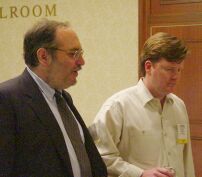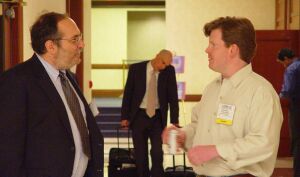|
|
www.satn.org
|
|||||||||
|
|
|
|||||||||
|
|
Comments from Frankston, Reed, and Friends
|
|||||||||
|
Friday, July 25, 2003 BobF at 11:57 PM [url]: AOL versus the Internet While tracking down another problem I found this in my SMTP log. I'm using the SMTP server that ships with every copy of XP pro. It makes a lot sense to use it instead of the one from your connectivity provider. You might as well do your own mail routing on your laptop in a hotel rather than having to struggle to find a server that is willing to accept your connection and work around any "favors" the premises' local provider is foisting on you. -, OutboundConnectionResponse, 7/25/2003, 15:08:55, SMTPSVC1, This seems to have started on 24-July-2003 There is little I can say now � I�m too angry and I find this very offensive. Static IP addresses, like Ethernet MAC addresses are mechanisms associated with the plumbing of the Internet. Dynamic addresses are the only ones that scale (I plan to post more about this soon). AOL is either a demonstrating a misunderstanding of the fundamental nature of the Internet or it is opting out of real participation. Maybe it has decided that the Internet is too messy and innovative and might offer its users too much freedom. Their advertising emphasize safetly not opportunity. No wonder they are losing subscribers -- once people discover the Internet AOL is just an obstacle to real participation. Wednesday, July 23, 2003 DanB at 6:51 PM [url]: Hijacked domain name examples Bob (below) mentions hijacked domains through exploiting typos. He also mentions the cases of educational websites whose domains (on expiration) end up pointing to porn sites, benefiting from all the links. People routinely buy expiring domain names based on the number of links in the search engines, hoping to get the "free" traffic before the search engines figure out the content has changed. (WebPhotoJournals is such an example, I assume.) I ran across this with a typo: www.sourceforge.net (open source development web site) www.sourseforge.net (look-alike site from a development company) Here are others (I tried these randomly to see how easy it was to find example -- there is no need for you to go to these sites and then get annoying popups...): www.betsbuy.com (offers casino and then goes to BestBuy) www.landsand.com (links to some clothes and search engine, popups) www.unitedarlines.com (vipFares travel site) www.usairlines.com (Orbitz) www.usairwys.com (links site) www.whitehouse.com (famous "adult" content site) www.whitehouse.net (parody site) See "Adult Site Operators Increase Hijacking Of Expired Domain Names" in Adlaw By Request, and Wired's "Sites Forlorn When Reborn as Porn". BobF at 5:40 PM [url]: More on the DNS Dan's comments illustrate two problems. One is the problem of the reuse of the DNS entry as in WebPhotoJournals. The problems with this should be so obvious that not understanding it means not understanding the Internet itself. The more subtle problem should still be obvious but people don't seem to about think it. The whole idea of hierarchical naming is flawed because it creates unnecessary dependencies. Instead of using paths, each should be globally unique so that it can be found without such a dependency. That's the kind of link you would put in a permanent directory. It could then point to a hierarchical mechanism like the DNS which is basically a tool for managing the Internet configuration information. Why do you have to change your email address just because your provider changes their advertising campaign and wants to use a different name? Why does ones email address depend on the name of ones service provider? (Why does a women's name depend on the husband du jour?) It's a bit complicated since, as perhaps in the Robb example, there is the question of who owns the pages and such issues stay ambiguous until there is a forcing factor as in this case. Things get more complicated since passive URLs aren't the only kind of linkage. There are also implementation details that are solvable but I won't go into here. For now, as I point out in my dotDNS proposal - simply separating the DNS from social policy is a JDI - Just Do It. Since it can coexist with the .com there is no reason not to provide an opportunity for escaping from the fundamentally flawed and dangerous mechanism. Dangerous - yes - just a simple typo can bring you to a hijacked fake site and exploit your trust. DanB at 1:53 PM [url]: The John Robb example Bob Frankston has been writing for some time about problems with the DNS, and how when you die (or otherwise stop paying for your domain name) rather than your material going into the public domain (well, 70++ years later...), it just disappears because, even if your server is still there, the links break. David Weinberger likes to point out how important links are to the web (such as in his book Small Pieces Loosely Joined). Google and other good search engines have become an important part of making the web useful, and millions of people depend upon them for "just in time" information to travel, get better health, shop, study, and more. "Helping" searchers with paid placement is becoming a business worth multi-billions of dollars. Now we have a great example of the fragility of the link and domain name. John Robb was the CEO and President of Userland. He had a popular weblog and website at jrobb.userland.com. On Monday, July 2, 2003, at 11:02:00am, he posted an entry that he was no longer with Userland. At 1:21:54pm, the founder of Userland, Dave Winer, posted that John was leaving, saying that John's posting was a surprise. I have no idea what went on between the two, but at around that point, if you went to jrobb.userland.com, or any of the "permanent links" to postings on his weblog, you got server errors of some sort. His website was gone. The domain "jrobb.userland.com" still worked, but it pointed to an empty directory (and still does as of this writting). Thousands of links to content, "gifts" from people telling you to leave their website to see what John wrote about some subject (often not in anyway connected to Userland business), broke. John now has a new website (jrobb.mindplex.org) where he put up a mirror of his old weblog, and has continued posting. At least the tool he used (Userland's Radio) is a client-based tool, and let him easily (I assume) regenerate his entire website. The content is back, but the links are not and will not. New links (like the one here) will help people trying to find out where his site went find it (especially if the search engines learn from us that "John Robb" is also associated with a new domain), but a speed-bump (a big one) has been added to old links. The web has dropped slightly in value. I don't know what went on between John, Dave, and Userland, but it provided a negative example for the web, not a positive one.  
Dave Winer and John Robb at the Jupiter Business Blogging Conference in June 2003 I had a similar experience. Years ago at Trellix (in 1999), I created a website at www.webphotojournals.com. It included a popular report about the Digital Storytelling Festival. Unfortunately, something happened, and the domain wasn't renewed at the right time, and someone else picked it up. (Someone registered in Hong Kong has it, and uses it to drive traffic to their directory of links to companies.) Boom. Broken links, including ones probably written by Dana Atchley (may he rest in peace) who ran the conference. A few weeks ago (right before the most recently Festival) I finally asked the copyright holder (Trellix/Interland) for permission to put up a mirror copy, and the whole site is now at www.bricklin.com/webphotojournals, with my report on the 1999 Festival at www.bricklin.com/webphotojournals/dstory/. (Luckily, I periodically make backups of most of my websites so FTPing them back up isn't too hard.) At least it's up there (it actually always was, if you knew the IP address of the server that kept on chugging along...), but lots of links are broken, and much of the effort to get those links (on websites and in search engines) is now creating ill-will. Sigh. Tuesday, July 22, 2003 BobF at 5:02 PM [url]: Always-On? I just posted some comments from the Always-On conference I just attended. I�d hoped to post it a few days ago but I�ve been delayed for two reasons. One is that I�m trying to do a not-too-bad job of writing which introduces delays due to thing like editing and thinking about what I want to say and making some attempt to explain rather than rant. But rants are necessary and the current model of computing deserves a rant and I just wrote one but � well, even a rant takes a little thinking so I�ll post this and then try to wrestle the rant into shape so I can post it. The rant is inspired by the other reason for the delay -- the recalcitrant PC. It seems to think I'm trying to do too much. The PC has lost its way and na�ve solutions like hierarchical trust models are going very much in the wrong direction. The always-on model of connectivity is a step in the right direction but we must apply it even within a single computing system as well as to environments (such as the home) that are part of the connected community that we call the Internet. I�ll try to post the rant and a more sober set of comments on these concepts as soon as I can which may not be very soon. |
||||||||||




